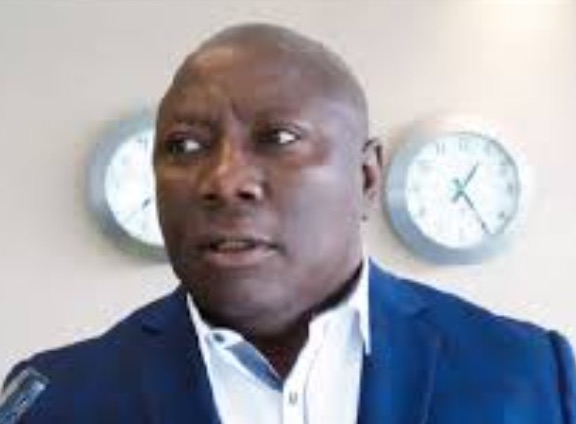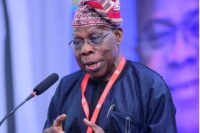By Bimbola Oyesola,
With the youth population in Nigeria more than half of the nation’s population, the general consensus has been that there is need for government and other stakeholders to see how they can resource youth development in Nigeria and devise methods to constantly and substantively engage them in preventing conflicts as well as in post-conflict reconciliation activities.
Lumumba Okugbawa, general secretary of Petroleum and Gas Senior Staff Association of Nigeria (PENGASSAN), in this interview with Daily Sun Workforce, opined that young people should not be seen as a liability, but as an opportunity, and to see how the society can proactively engage them in all discussions at all levels.
Lamenting the level of insecurity in the country, especially in the oil and gas sector where workers are exposed to kidnapping and other threats daily, he charged government to create the enabling environment to attract investment.
According to him, insecurity in Nigeria is a huge challenge, and it is doing a lot of harm to the economy, advocating and urging government to step up the game.
Okugbawa also advocated that the Central Bank of Nigeria’s Governor, the Minister of Finance and all the agencies under it must work together to ensure the President’s mission of economic recovery can be achieved.
He spoke further on Nigeria’s participation at the recent International Labour Conference (ILC), the adverse effects of some government policies on businesses and general population and other issues of national importance.
Excerpts:
Take-home from the recent 113th ILC in Geneva
The government, employer and worker delegates from the ILO’s 187 member states at the 2025 session of the conference addressed important world of work matters such as new international standards on the protection of workers against biological hazards in the working environment, decent work in the economy and innovative approaches to promoting transitions from the informal to the formal economy.
The ILC adopted a Resolution on reducing Informality and support the transition to formal work.
The resolution called for urgent action to improve working conditions, extend social protection, and create decent jobs, especially for those most affected by informality.
Formal approval was given to the ILO’s tripartite contribution to the Second World Summit for Social Development, set for November 2025 in Doha.
The ILC adopted Biological Hazards in the Working Environment Convention, 2025 (Convention No. 192) making it the 1st international instrument specifically addressing biological hazards in the working environment.
The ILC also charged member states to formulate national policies & adopt measures on occupational safety and health that include the prevention and protection against biological hazards.
Approved amendment was also made to Maritime Labour Convention, 2006 (MLC), and the changes was for the right to shore leave and repatriation, and call for recognizing seafarers as key workers.
The MLC is a binding international law for ensuring minimum working and living standards for all seafarers on ships. India ratified the MLC in 2015.
The ILC equally held its 1st standard-setting discussion on decent work in the platform economy, an important step toward improving rights and conditions for digital platform workers.
PENGASSAN’s position on insecurity in Nigeria and impacts on members
Insecurity in Nigeria is a huge challenge, and it is doing a lot of harm to the economy. We are advocating and urging government to step up the game.
Today, in an average offshore installation site, we have five to 10 security vessels manning the installation round the clock, with 100 to 200 personnel working there.
The cost of manning each security vessel is not less than $5,000 per day. With about five security vessels, we have $25,000 daily.
There too, we’ll pay the naval officers, buy AGO and by the time you add all these costs it could be $30,000 per day. That adds to the cost of operation. To investors, it would be preferable to go to neighbouring countries that are relatively secure, instead of investing in Nigeria.
In the bill, we advocated that government must look at the peculiarities. If you want to increase royalties as other countries, you must create the enabling environment to attract investment.
We are having challenges on securing the pipelines, securing the offshore and onshore installations. If you go to an offshore installation, it is like you have a battalion of army that are guiding most of the onshore installation, which ought not to be so. That is why the National Executive Council of PENGASSAN recently resolved that beyond mere saying, we did a security awareness campaign across all our zones to advocate and also rewarded some police officers that were exemplary on their jobs. We distributed N2 million with about N250,000 each to eight police officers across the zones to encourage and identify with them.
We did an open letter to President Muhammadu Buhari, the immediate past President, for us to draw his attention that we are facing challenges in the oil and gas industry regarding security.
The security awareness campaign will be constant. Most of our members are being kidnapped.
We are exposed to insecurity. However, as a union we are trying to partner with security agencies and give them all the maximum support they require.
Implications for businesses in Nigeria with fiscal and monetary policies running at cross purposes
It is not sufficient for these authorities to run programmes or policies that are not targeted at achieving the over-arching objectives of the president.
The fiscal and monetary authorities are to help him achieve those objectives.
In that line, it rests on the president to ensure he understands where he is taking the economy or he has a firm perspective on where he is taking the economy.
The actions of the Central Bank of Nigeria’s Governor, the Minister of Finance and all the agencies under it must all work together to ensure the president’s mission can be achieved.
However, whatever they do stops at the desk of the President.
It was unfortunate that the Supreme Court was dragged into an issue that many experts have called a simple monetary policy issue that should have been implemented differently and that Nigerians would have gladly supported if rightfully implemented.
Government’s cashless policy and survival of small businesses
Some have already gone into extinction. A business that is already on lifeblood, you now squeeze the pipe that is giving it blood and you now expect absolute magic.
In the informal sector, the volume of cash that is transacted daily could only be imagined. Go to Mile 12 market and other markets and see.
It is because those at the top do not feel all these things, which is wrong.
A lot of businesses have crashed in the Micro, Small and Medium Enterprises (MSMEs) sector due to the policy, which we feel is laudable but the implementation is at low par.
Nigeria achieving economically sound path of inclusiveness reforms
You mentioned an interesting word, inclusiveness. We feel it is wrong in whatever policy for you to exclude the people you are planning to include, because of the inclusiveness you want to achieve with the new Naira redesign or cashless policy, you ended up excluding so many individuals from that policy.
All the knee-jerk response that the CBN said its officers are sensitising Nigerians in the rural areas is an afterthought.
You set up policies to achieve a specific objective because the policies are operators at the mid-level, which predominantly are the private sector. If you are creating a policy that you feel will fundamentally take the economy to a point, you must get the concurrence of those that are meant to implement those policies. If you want me to implement it and the policy to impact me, then the reasonable thing to do is to get me at the policy formulation stage.
Let me know the intention of the policy. This is important because they are part of the planning. At the point of implementation, you already have their buy-in and also put them in the analysis, whether it achieves its aim or not.
At that point, you have built inclusiveness and a national consensus. That has been what is lacking. You cannot force the policy on us in the 21the century, rather you carry us along.
Economic and social policies needed to provide sustainable and quality jobs for youth
There are no silver bullets, while a major mistake would be to address youth in isolation and to focus on specific policies for youth only. Though there are youth-specific factors – notably in terms of access to labour markets and employment conditions, young people are not located on an island; they are part of the overall economy and society.
In this respect, structural transformation through economic diversification and skills improvement can be a major driver for youth employment and accessing decent jobs.
Another challenge is that public policies are often very sectorial and specialised, which creates an artificial segmentation while policy integration should be pursued.
Economic diversification and structural reform, particularly in the agricultural sector, in addressing youth unemployment and underemployment in the region
Economic diversification, productive investment and skills development are key and must be facilitated by improved governance.
This is central to structural reform. Diversification is also a strong driver of change at the sectorial level. In agriculture, for example, moving from staple crops to high value and processed products combined with productivity improvement can radically change job requirements, the level of returns and the quality of employment. The role of technology should not be underestimated.
As an example, while necessary for increasing productivity and improving the quality of jobs, the adoption of highly powered motorisation on large farms can lead to job destruction and negative net employment effects, if not accompanied by growth in other sectors.
The use of appropriate technologies (i.e. appropriate to the structural context) which favours employment, the management of natural resources and low carbon foot prints need to be considered. The youth can strongly contribute to the Sustainable Development Goals and to action against climate change in this context.
Changes Government needs to make to be more relevant in young people’s lives
There are two approaches that we can adopt. Firstly, I think the Federal Government has a responsibility to go to young people and meet them where they are. We expect all youths from different communities, religious and ethnic backgrounds to be part of Government developmental projects.
There is need for Government and other stakeholders to see how they can resource youth development in Nigeria and devise methods to constantly and substantively engage young people in preventing conflicts as well as in post-conflict reconciliation activities.
There is a need to see young people not as a liability but as an opportunity
What we have here is that most often the Government is not very familiar to the young people doing good work in advancing the lives of youth in their villages and communities. By taking the Government closer to young people, I do not necessarily mean physically, but through new technologies, such as social media, to connect with youth in a language they can understand.
The second approach is to have the government system look at young people.
Today, the youth comprise more than half of the Nigeria’s population – the largest youth population in the history of the country.
There is a need to see young people not as a liability but as an opportunity, and to see how we can proactively engage them in all discussions, at all levels.

















Leave a comment